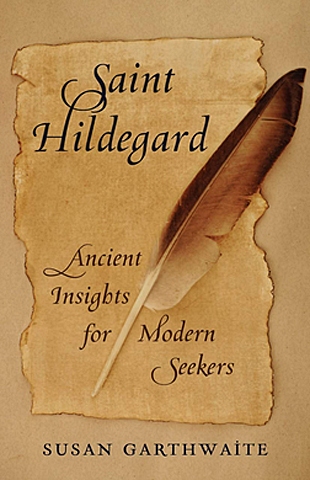“St. Hildegard says, ‘Be such that you become the friend of God.’ What does this entail? We began our journey with the foundational question posed by St. Hildegard: ‘Is there a God or not?’ Early experiences of God made us seekers for more. St. Hildegard encouraged, ‘Be a faithful friend to your soul.’ We reviewed spiritual practices that ‘contribute to the health of one’s soul or lift one’s spirit up to God.’ We engaged Scripture to ‘understand that all these things pertain to us.’ We ‘persevered in seeking God’ through prayer and discernment.
“We gradually discovered God as the protagonist of our stories, including in our work. We saw that all of life must be spiritually integrated if we are to ‘be the special friend of God.’ Yet work exposed our need for transformation and greater spiritual freedom. We could not ‘remain unaware of Who … God may be, wishing only to have God as our servant.’ A relationship of friendship emerged in our life with God and became the focus of prayer.
“‘How do I deserve to share in the highest joys?’ In drawing closer to God, we found ‘that our faces were very dirty.’ The prospect of greater intimacy with God stirred our fears. But ‘God mercifully drew us toward Godself.’ We found ourselves ‘in the dark night of our experience’ and let go in loving trust, for ‘God alone and no one else is able to free us.’ Through mystical stripping-away, ‘God…made us new persons, with a life in us different from what we had …before.’ We attained a greater ability to ‘be mild and gentle in … spirit and heart.’ We became more our true selves and better, deeper friends of God.
“In our longing ‘to be with the sweetness of God’ was the seed of mysticism. God became for us One Who ‘is not silent.’ We became people whose minds are touched by the grace of God, who thirst for the justice of God, who desire to be of the same mind as Christ. In the deep sincerity of prayer, the Holy Spirit touched us, that we may always ‘look to God Who has touched us.’ We discovered that God sometimes takes over prayer such that our ‘seeing, hearing, and knowing are simultaneous.’ In prayer, ‘things are shown to us’ such that we must truthfully say, ‘I see as I saw, and I hear as I heard.’
“At first we ‘showed to no one’ what is mystical, but God did not allow reticence to persist, for ‘God works…for the glory of God’s name, not for the glory of any earthly person.’ ‘Like the sparks of a fire,’ our experiences occurred ‘as God foresees the need.’ Through mysticism, we were transformed into more passionate, freer disciples, convinced of God’s presence and action in our lives. We now ‘burn with so great a desire in love for God, that we can never be satisfied.’ God invites, ‘Hold Me earnestly…as your dearest Friend.’ ”
